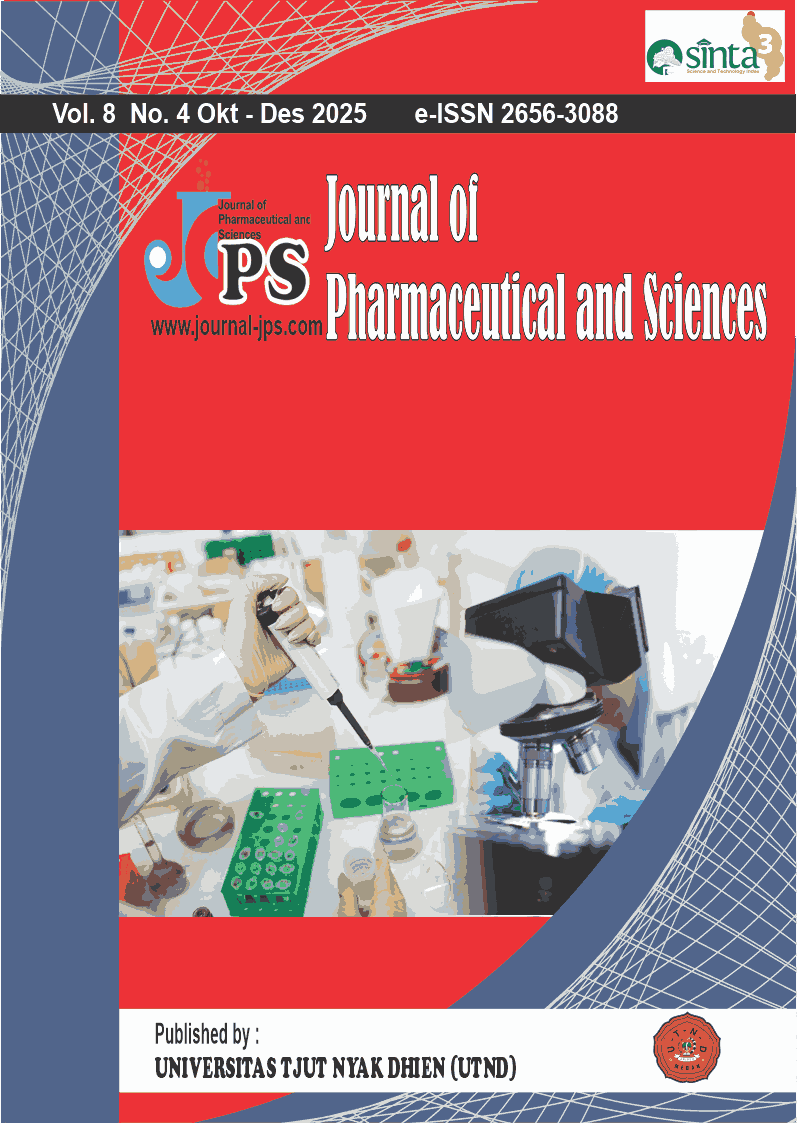Association Between Length of Hospital Stay and Blood Pressure and Proteinuria Outcomes in Severe Preeclampsia
Main Article Content
Page: 2285-2290
Abstract
Severe preeclampsia is a major obstetric complication associated with maternal and perinatal morbidity and mortality. Hospitalization duration may influence clinical outcomes, including blood pressure and proteinuria, particularly in patients receiving antihypertensive therapy with nifedipine or methyldopa.
This study aims to evaluate the association between the length of hospital stay and changes in systolic and diastolic blood pressure, as well as proteinuria, in patients with severe preeclampsia treated with nifedipine or methyldopa. This retrospective study reviewed medical records of patients diagnosed with severe preeclampsia and admitted to Dr. M. Djamil Central General Hospital, Padang, between January and December 2023. Patients were categorized into two groups based on hospitalization duration: <5 days and ≥5 days. All patients received monotherapy with either nifedipine or methyldopa. Data on patient demographics, clinical parameters, and hospitalization length were collected. Statistical analyses were performed using the independent t-test and the Mann–Whitney test, with a significance level of p<0.05. Of 60 patients included, 44 (73.3%) were hospitalized for ≥5 days, while 16 (26.7%) stayed <5 days. Patients with ≥5 days of hospitalization experienced a significantly greater reduction in systolic blood pressure (40.93 mmHg vs. 29.00 mmHg, p=0.025) and proteinuria (23.06 vs 33.20, p=0.031) compared to the <5-day group. No significant difference was observed in diastolic blood pressure reduction (p=0.128).
Downloads
Article Details

This work is licensed under a Creative Commons Attribution-NonCommercial-ShareAlike 4.0 International License.
References
Veri N, Lajuna L, Mutiah C, Halimatussakdiah, Dewita. Preeclampsia: Pathophysiology, diagnosis, screening, prevention, and management. Femina: Jurnal Ilmiah Kebidanan. 2024;4(1):283–96. doi:10.30867/femina.v4i1.588 DOI: https://doi.org/10.30867/femina.v4i1.588
Tomimatsu T, Mimura K, Matsuzaki S, Endo M, Kumasawa K, Kimura T. Preeclampsia: Maternal systemic vascular disorder caused by generalized endothelial dysfunction due to placental antiangiogenic factors. Int J Mol Sci. 2019;20(17):4246. doi:10.3390/ijms20174246 DOI: https://doi.org/10.3390/ijms20174246
American College of Obstetricians and Gynecologists (ACOG). Gestational hypertension and preeclampsia: ACOG Practice Bulletin, Number 222. Obstet Gynecol. 2020;135(6):e237–60. doi:10.1097/AOG.0000000000003891 DOI: https://doi.org/10.1097/AOG.0000000000003891
Tsakiridis I, Giouleka S, Arvanitaki A, Giannakoulas G, Papazisis G, Mamopoulos A, et al. Gestational hypertension and preeclampsia: An overview of national and international guidelines. Obstet Gynecol Surv. 2021;76(10):613–33. doi:10.1097/OGX.0000000000000942 DOI: https://doi.org/10.1097/OGX.0000000000000942
Togarikar SM. Efficacy of methyldopa versus nifedipine in mild and severe pregnancy-induced hypertension. Int J Reprod Contracept Obstet Gynecol. 2017;6(10):4544–8. doi:10.18203/2320-1770.ijrcog20174439 DOI: https://doi.org/10.18203/2320-1770.ijrcog20174439
Wen T, Yu VX, Wright JD, Goffman D, Attenello F, Mack WJ, et al. Postpartum length of stay and risk for readmission among women with preeclampsia. J Matern Fetal Neonatal Med. 2020;33(7):1086–94. doi:10.1080/14767058.2018.1514382 DOI: https://doi.org/10.1080/14767058.2018.1514382
Muteke K, Musaba MW, Mukunya D, Beyeza J, Wandabwa JN, Kiondo P. Postpartum resolution of hypertension, proteinuria, and acute kidney injury among women with preeclampsia and severe features at Mulago National Referral Hospital, Uganda: a cohort study. Afr Health Sci. 2023;23(3):27–36. doi:10.4314/ahs.v23i3.6 DOI: https://doi.org/10.4314/ahs.v23i3.6
Backes CH, Markham K, Moorehead P, Cordero L, Nankervis CA, Giannone PJ. Maternal preeclampsia and neonatal outcomes. J Pregnancy. 2011;2011:214365. doi:10.1155/2011/214365 DOI: https://doi.org/10.1155/2011/214365
Koual M, Abbou H, Carbonnel M, Picone O, Ayoubi JM. Short-term outcome of patients with preeclampsia. Vasc Health Risk Manag. 2013;9:143–8. doi:10.2147/VHRM.S38970 DOI: https://doi.org/10.2147/VHRM.S38970
Kurniawan G, Wati H, Annisa R. The difference in the effectiveness of antihypertensive therapy between nifedipine and methyldopa in preeclampsia patients at Dr. H. Moch Ansari Saleh Regional General Hospital. Jurnal Ilmiah Farmasi. 2023;19(2):161–8. doi:10.20885/jif.vol19.iss2.art14 DOI: https://doi.org/10.20885/jif.vol19.iss2.art14
Cozzi GD, Battarbee AN, Sanjanwala AR, Casey BM, Subramaniam A. Association of maternal medical comorbidities with duration of expectant management in patients with severe preeclampsia. Am J Perinatol. 2024;41(S 01):e1521–30. doi:10.1055/s-0043-1768232 DOI: https://doi.org/10.1055/s-0043-1768232
Li C, Gou W, Liu J, Liu D, Li X, Chen Q. Length of stay in the ward following a preeclamptic pregnancy. J Hum Hypertens. 2022 Feb;36(2):201-206. doi: 10.1038/s41371-021-00484-w. DOI: https://doi.org/10.1038/s41371-021-00484-w
Federspiel JJ, Suresh SC, Darwin KC, Szymanski LM. Hospitalization duration following uncomplicated cesarean delivery: predictors, facility variation, and outcomes. AJP Rep. 2020;10(2):e187–97. doi:10.1055/s-0040-1709681 DOI: https://doi.org/10.1055/s-0040-1709681
Publications Committee, Society for Maternal-Fetal Medicine; Sibai BM. Evaluation and management of severe preeclampsia before 34 weeks’ gestation. Am J Obstet Gynecol. 2011;205(3):191–8. doi:10.1016/j.ajog.2011.07.017 DOI: https://doi.org/10.1016/j.ajog.2011.07.017
Kumsa H, Mergiyaw D. Obstetrical and perinatal outcomes of women with preeclampsia at Woldia Comprehensive Specialized Hospital, Northeast Ethiopia. Front Med (Lausanne). 2024;11:1326333. doi:10.3389/fmed.. 2024.1326333 DOI: https://doi.org/10.3389/fmed.2024.1326333
Alhawassi TM, Krass I, Pont LG. Impact of hospitalization on antihypertensive pharmacotherapy among older persons. Drugs Real World Outcomes. 2015;2(3):239–47. doi:10.1007/s40801-015-0033-6 DOI: https://doi.org/10.1007/s40801-015-0033-6
Salama M, Rezk M, Gaber W, Hamza H, Marawan H, Gamal A, et al. Methyldopa versus nifedipine or no medication for treatment of chronic hypertension during pregnancy: a multicenter randomized clinical trial. Pregnancy Hypertens. 2019;17:54–8. doi:10.1016/j.preghy.2019.05.009 DOI: https://doi.org/10.1016/j.preghy.2019.05.009
Magee LA, Brown MA, Hall DR, Gupte S, Hennessy A, Karumanchi SA, et al. The 2021 International Society for the Study of Hypertension in Pregnancy classification, diagnosis & management recommendations for international practice. Pregnancy Hypertens. 2022;27:148–69. doi:10.1016/j.preghy.2021.12.002 DOI: https://doi.org/10.1016/j.preghy.2021.09.008
Hazra PK, Mehta A, Desai B, Pandey U, Mehta KD, Bajpai S, et al. Long-acting nifedipine in the management of essential hypertension: a review for cardiologists. Am J Cardiovasc Dis. 2024;14(6):396–413. doi:10.62347/RPMZ6407 DOI: https://doi.org/10.62347/RPMZ6407
Brown MA, Magee LA, Kenny LC, Karumanchi SA, McCarthy FP, Saito S, et al. Hypertensive disorders of pregnancy: ISSHP classification, diagnosis, and management recommendations for international practice. Hypertension. 2018;72:24–43. doi:10.1161/Hypertensionaha.. 117.10803 DOI: https://doi.org/10.1161/HYPERTENSIONAHA.117.10803
Auger N, Amar S, Paradis G, Ayoub A, Lewin A, Maniraho A, et al. Preeclampsia and the onset of renal disorders in the long-term period following pregnancy. Am J Nephrol. 2025. doi:10.1159/000547538 DOI: https://doi.org/10.1159/000547538
Steegers E, von Dadelszen P, Duvekot J, Pijnenborg R. Pre-eclampsia. Lancet. 2010;376(9721):631–44. doi:10.1016/S0140-6736(10)60279-6 DOI: https://doi.org/10.1016/S0140-6736(10)60279-6





